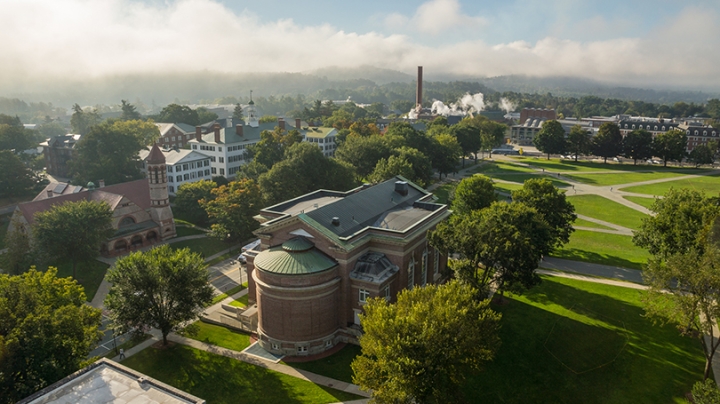The College will host a gathering of world-renowned researchers for the Dartmouth Symposium on the Young Mind and Brain on Sept. 19, highlighting cutting-edge neuroscientific scholarship on the development of the young brain and the way the development affects behavior.
The speakers will share the latest research on topics such as emotional development during adolescence, vulnerability to substance abuse, brain mechanisms underlying illnesses like autism and ADHD, and the effects of neurobiological, chemical, environmental, social, and technological forces.
“As a pioneer in cognitive neuroscience and a leader in the psychological and brain sciences situated on a premier liberal arts campus, Dartmouth is uniquely positioned to bring together experts to translate and to disseminate the latest findings on the young mind and brain,” says Jay Hull, associate dean of faculty for the social sciences.
Hull, a professor of psychological and brain sciences, says the symposium will highlight some of the most exciting work around development of the young mind and brain.
David Bucci, chair of the Department of Psychological and Brain Sciences, says Dartmouth, where cognitive neuroscience was born as a field of study in the 1990s, brings an important liberal arts perspective to this work, while at the same time, integrates neuroscientific efforts across clinical and medical research and engineering.
“Critically, no other institution has embraced a focused collaboration between basic and applied brain science, social science, and the humanities in pursuit of deep, applicable knowledge of the young mind,” Bucci says.
Duane Compton, dean of the Geisel School of Medicine, says the symposium illustrates the potential of interdisciplinary collaborations across the professional schools and within the College.
“One of the greatest challenges at the intersection of medicine and the social sciences is trying to understand how the brain develops and functions to control behavior,” says Compton, who is also a professor of biochemistry and cell biology. “I’m excited to see the cross-institutional collaborations building at Dartmouth to tackle that challenge and to sponsor this outstanding symposium.”
Much of the research into the cognitive functions of the brain has focused on adults, Bucci says, in part because the rapid neurological changes during development make research on the young mind very difficult.
“During adolescence, there is impulse control and language development, social development, environmental and social pressures, significant biomolecular changes, and there are those hormones swirling around,” says Bucci, the Ralph and Richard Lazarus Professor of Psychological and Brain Sciences.
“And now they are being bombarded with information and technology. We have to ask what that is doing to the brain, and what’s it doing permanently?”
The study of this profoundly influential phase of human cognitive development is critical, Bucci says. “It would not be overstating it to say we are studying the future of the human mind.”
The eight researchers slated to speak:
- Joseph Buxbaum, professor of psychiatry, neuroscience, and genetics at Icahn School of Medicine at Mount Sinai Hospital in New York City. Buxbaum has worked extensively on autism treatment and care.
- BJ Casey, professor of psychology at Yale University and adjunct professor of psychology, psychiatry, and neuroscience at the Sackler Institute. Casey is a world leader in human neuroimaging and its use in typical and atypical development.
- Anthony Grace, the distinguished professor of neuroscience and professor of psychiatry and psychology at the University of Pittsburgh’s Center for Neuroscience. Grace's research applies neurobiology and psychiatry to find neurobiological correlates of mental disorders and the effects psychotherapeutic drugs.
- James Hudziak, a physician and professor of psychiatry and pediatrics at the University of Vermont College of Medicine. Some of Hudzak’s recent work includes the studies “Risk and Resilience in Maltreated Children” and “Child Behavior Checklist-Dysregulation Profile: Genes, Environment, and Life Course.”
- Kamran Khodakhah, the Harold and Muriel Block Chair in Neuroscience at Albert Einstein College of Medicine in New York. Khodakhah’s research seeks to understand the role of the cerebellum in motor coordination, cognitive and social function, and in addiction.
- Robert Malenka, physician and the Nancy Friend Pritzker Professor in Psychiatry and Behavioral Sciences at Stanford Medicine. His work looks at the role long-lasting activity-dependent changes in the efficacy of synaptic transmission play in the development of neural circuits and how this may mediate many forms of learning and memory.
- Eve Marder, a professor of biology at Brandeis University and a member of the National Academy of Sciences. Marder’s work focuses on understanding how circuit function arises from the intrinsic properties of individual neurons and their synaptic connections.
- Patricio O'Donnell, a physician and adjunct professor at McLean Hospital in and Harvard Medical School. Some of O’Donnell’s recent work includes “Opportunities for New Drug Development in Psychiatry,” and “Juvenile antioxidant treatment prevents adult deficits in a developmental model of schizophrenia.”
The Dartmouth Symposium on the Young Mind and Brain, which is open to the public, will be held from 9 a.m. to 5 p.m. on Sept. 19 at the Hanover Inn in Hanover. For more information or to register, visit the symposium website.
The meeting is sponsored by the Lincoln Filene Professorship with the support of the Department of Psychological and Brain Sciences, as well as the departments of Molecular and Systems Biology and Psychiatry at Geisel and the Department of Neurology at Geisel and Dartmouth-Hitchcock Medical Center.
